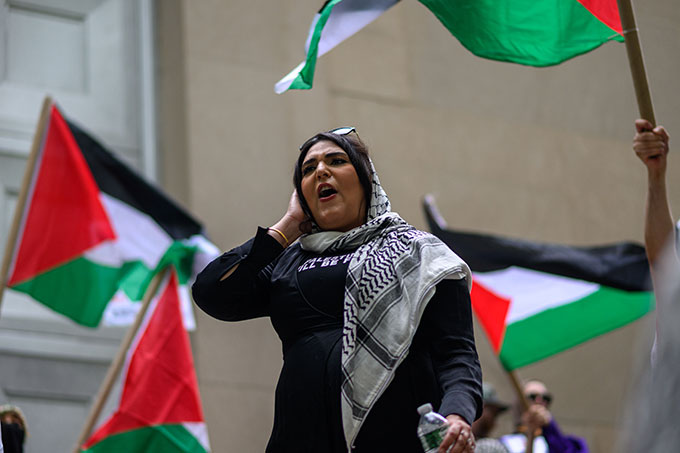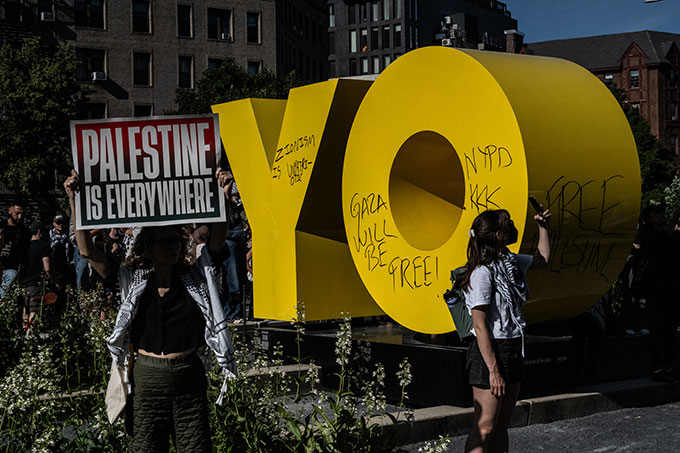On August 15, members of Within Our Lifetime (WOL) marched some 70 blocks across New York City, starting at the United Nations and ending in Morningside Park. Along the way, they boarded the subway en masse and resurfaced near Columbia University to join student protesters and implicitly call for the conquest of Israel. One demonstrator waved a Hezbollah flag; others vandalized a memorial near the mayor’s mansion.
The march showcased some of the pro-Palestinian movement’s most radical elements and highlighted the threat they pose to public order. As the vandalism demonstrates, WOL and its associates have a long history of lawlessness, including property destruction and building occupation. As a new school year dawns and activists push for another round of campus protests, city and university leaders must remain vigilant.
Finally, a reason to check your email.
Sign up for our free newsletter today.
Within Our Lifetime is a pro-Palestinian organization founded by Nerdeen Kiswani, a CUNY graduate with a long history in the city’s activist scene. Kiswani co-founded the New York City chapter of Students for Justice in Palestine in 2015, which rebranded as WOL in 2018. Kiswani remains the group’s chairwoman despite multiple arrests.
The recent WOL march began as a protest at the United Nations, which has been a major target of pro-Palestinian demonstrations. Activists in recent weeks have locked embassy gates and surrounded the entrances of diplomatic missions. Kiswani also confronted acting U.S. ambassador to the U.N. Dorothy Shea while she was dining at a restaurant.
Why the focus on the U.N.? One reason is a recent United Nations conference on a potential two-state solution to end the Israel-Hamas war. That conference prompted Masar Badil, an organization with close ties to the terrorist group the Popular Front for the Liberation of Palestine (PFLP), to call on its supporters in the West to “take to the streets, besiege Zionist embassies, and turn every public square and city into a point of direct confrontation.”
In the days that followed Masar Badil’s missive, demonstrators across the country targeted Arab embassies, accusing the officials inside of being ethnic traitors or of “normaliz[ing] ” Israel. Activists targeted the Egyptian and Jordanian missions and consulates, in particular, for refusing entry to Palestinians from Gaza.
Though it’s impossible to say to what extent Masar Badil inspired WOL’s actions, the two organizations have clear ties. Masar Badil’s leader, Khaled Barakat, appeared alongside Nerdeen Kiswani at the controversial Resistance 101 event at Columbia University. Barakat’s wife, Charlotte Kates—the founder of Samidoun, a designated front for the PFLP—was also a panelist at the event. Kates and Kiswani have also appeared together on panels with CUNY 4 Palestine and the Democratic Socialists of America International.

Regardless of motive, the anti-U.N. protests are just the latest example of WOL’s increasing radicalism after the October 7, 2023, terror attacks against Israel. In the months that followed the attacks, WOL organized events, such as “Flood Manhattan for Gaza” and “Christmas is Canceled,” which resulted in arrests, vandalized NYPD cruisers, and street fights. Kiswani described the October 7 attacks as “a psychological and tactical victory for the Palestinian resistance,” adding later that “there has never been any case in history where oppressed people achieve liberation by just asking for it nicely.”
Last year, WOL’s “Day of Rage” protest saw vandalism of the 107th Infantry Memorial, the burning of an American flag, and clashes with police outside the Met Gala. A month later, WOL protesters rushed into the Brooklyn Museum and set up an encampment, resulting in more arrests, vandalism, and even damaged artwork. Following the Brooklyn Museum takeover, the group encouraged its followers to “[t]ake autonomous action,” sharing a map of various museums. Soon after, the home of the Brooklyn Museum’s director was vandalized.
Even as the activities of other pro-Palestinian groups have died down, WOL has continued its disruptive activity. In a separate incident this month, the group again clashed with police outside of Grand Central Station. Earlier this year, it was involved in a protest at Tisch Hospital, the chaotic “Nakba Day” demonstration, and several events targeting visiting Israeli government officials like Prime Minister Benjamin Netanyahu, former Prime Minister Naftali Bennett, and National Security Minister Itamar Ben-Gvir.

Despite its repeated involvement in lawless protests, WOL has largely evaded scrutiny. Unlike other radical left-wing groups, it is not a registered nonprofit. Kiswani has stated her belief that becoming a nonprofit limits organizations’ ability to be sufficiently radical. “The revolution will not be funded. NGOs will not bring the path of resistance,” she told Resistance 101 participants. “The NGOization of Palestinian society is one of the biggest impediments to why [sic] we’re not free today, because we are united in resistance.” As a result, Americans have little insight into WOL’s finances and operations.
Recent demonstrations suggest that WOL may continue to escalate. Yet city authorities have done little in response beyond arresting disruptive activists, with district attorneys often dropping charges. Manhattan district attorney Alvin Bragg, for example, dropped charges against Columbia University students, and his office declined to prosecute numerous criminal summonses from pro-Palestine demonstrations across the city. When prosecutors drop charges against pro-Palestine demonstrators; when the Brooklyn Museum refuses to press charges against those who were arrested during an occupation of its lobby, citing “police brutality”; and when diversion programs like Project Reset make summonses vanish, accountability breaks down and sends a dangerous message to bad actors. In that vacuum, groups like Within Our Lifetime thrive, emboldened by the knowledge that disruptive tactics rarely bring real consequences. And WOL may also soon have a friend in the mayor’s office, as frontrunner Zohran Mamdani has previously participated in its protests.
Allowing WOL to evade consequences only reinforces the perception that New York City has a two-tiered justice system. City leaders and law enforcement must draw a clear line between protected speech and lawless action—and prosecute those who break the law while hiding behind the mantle of protest.
Top Photo by Andrew Lichtenstein/Corbis via Getty Images
City Journal is a publication of the Manhattan Institute for Policy Research (MI), a leading free-market think tank. Are you interested in supporting the magazine? As a 501(c)(3) nonprofit, donations in support of MI and City Journal are fully tax-deductible as provided by law (EIN #13-2912529).
Source link















